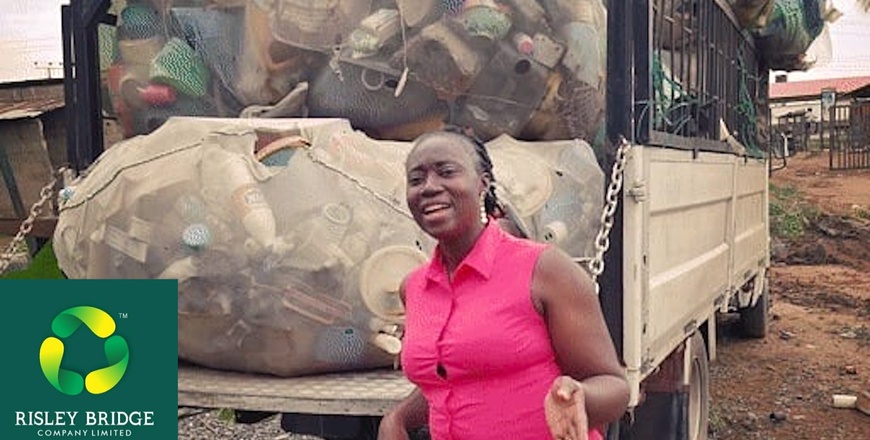Plastic, plastic, and more plastic. From shopping bags to bottles, coffee cups, and packaging material: plastic is everywhere. The United Nations estimate that the world is using 5 trillion plastic bags per year alone, which come over and above the millions of tonnes of other disposable plastic waste. The saddest part is that less than a 10th of this amount is recycled. The rest is clogging up drains, filling up landfills, and killing our oceans, animals and people. This should be different, says Afrinection member Olaitan Olakanmi (35) from Lagos, Nigeria. That's why she founded recycling venture Risley Bridge Company.
Q. What is your company, Risley Bridge Company, all about?
A. Risley Bridge Company Limited was founded by me and Oladapo in 2012 but started its operations in August 2017. In short, we collect plastic waste, turn it into waste pellets which are recycled and used in the manufacturing of new plastic products. For an overview of our recycling process, click here.
Q. How much waste do you recycle per month? How many people do you employ?
A. Risley Bridge Company Limited recycles on an average recycle 50 metric tonnes of waste plastic per month. It operates presently in Sango Otta, Ogun State of Nigeria and we employ 4 full-time employees and 7 contract employees.
Q. How big is the waste problem in Nigeria?
A. Nigeria produces over 25 million tonnes of waste per year. Of that, only 20 to 30% is collected. About half of that is recycled. There are lots of waste blocking drains and water bodies, which is adversely affecting people, animals and the environment. The problem is that urban populations are growing at an alarming rate, which increases the amount of waste.
Q. What makes being an ecopreneur different from being a normal entrepreneur?
A. An entrepreneur sees competition in the market space and takes advantage to get or stay ahead of his or her game, but an ecopreneur focuses on collaboration and partnership to achieve more in a sustainable way. Finally, an ecopreneur is concerned about the earth, thinks green, and acts green. They put the planet before profits. This doesn’t mean an ecopreneur does not make a profit. They strike a balance between making money and protecting the environment.
Q. What has been the most challenging thing in terms of setting up and running Risley Bridge Company?
A. Setting up a recycling plant is very capital intensive. You must be financially prepared before venturing into this space. Sourcing the equipment, machinery, and operators are some other challenges. However, the major challenge we have presently is the (un)availability of power. Electricity generation is a major challenge in Nigeria. We are working at getting our own transformer to put an immediate end to this issue.
Q. What was the highlight?
A. We have been able to improve the environment through the collection of waste plastics, which is directly impacting the health of Nigerians. At the 2018 World Environment Day, we were at Total Nigeria PLC to show them our reprocessed plastics, taught the company's staff on proper plastic identification and recycling as well as sustainability.
Q. What are your key tips for people who want to explore the ecopreneurship space?
A. An ecopreneur builds a business that creates products or services that profit and influence people and the planet. First, you will need to be clear about which of the Sustainable Development Goals (SDGs) you want to support. Once you are clear about that, proceed by making plans and strategies for achieving this vision. Make your achievements and work visible to ensure people know what impact you are making in touching people's lives and the environment.
Q. What is your ultimate goal? Where do you want to be in five years from now?
A. My ultimate goal as an ecopreneur is to see a world that is free from waste and issues created by humans. In five years’ time, I hope to be in a position where I can offer solutions to the world's most challenging issues in a sustainable manner.
Q. Anything else you would like to add?
A. I was recently recognized and rewarded by United Nations Sustainable Development Solutions Network with a signed copy of Prof. Jeffrey Sachs magnum opus, The Age of Sustainable Development, in recognition for my works in saving the planet. I also won a green award from African Clean-Up Initiatives for enhancing a sustainable environment. Finally, I have a Facebook Group (You And The Environment - #YATEseries) where I teach and address issues pertaining to environmental sustainability.







Psygon Services on Cleantech businesses to watch in 2024
John Dou Dou on Being Your Own Boss - Part 2
Friends for upcoming artist ltd on Crypto Fest 2022 Hosted by Bitcoin Events
ignatious mukombwe on Being Your Own Boss - Part 3
Muhondo Organic Farming Center on Woman power: Top 5 female change-makers in West Africa
Muhondo Organic Farming Center on Woman power: Top 5 female change-makers in West Africa
Muhondo Organic Farming Center on African Development Bank: Boosting African farming doesn't require aid but investing in agripreneurs
Warren Adams on Secure funding for your start-up like a pro: five tips
AfriTech Hub on AfriTech Hub: Increasing the STEM Workforce
TOBAINO FOODS on What does it take to be a millennial entrepreneur?